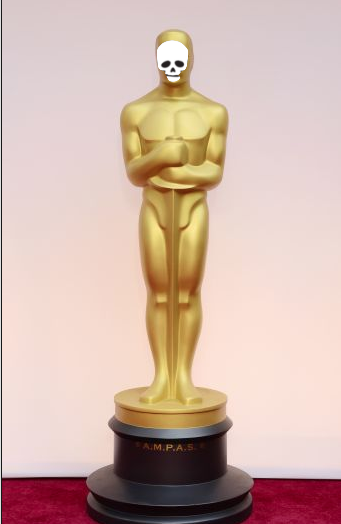The Oscars are being given out tonight only a few blocks from the Obitmagaine niche, and we’re excited. But every year we think something’s missing. Not to take anything away from the actors, writers, directors, and various crafts honored each year, but we think there should be awards for the best death scenes.

If death clarifies, death scenes clear a path to dramatic immortality. We’re always interested in people’s last words (when was the last time you talked about someone’s first?), so why shouldn’t we also pay attention to their last scene. The final curtain, if you will. But Woody Harrelson will not be thanking the Academy for his “Three Billboards” character’s suicide in a stable. (A scene that made us wonder— should death live by the same rules that Oscar Wilde had for sex: do whatever you want as long as you don’t scare the horses?)
To rectify that, please check out the nominees for this year’s Scullys: our survey of our favorite deaths of people, animals, and things in movies.
The Scully for Most Existential Death goes to Jean-Paul Belmondo, in Jean-Luc Godard’s “Breathless.”
Belmondo won this in a walk (or a stagger, if we’re being precise). Belmondo’s Michel is on the run from the cops from the opening of Godard’s breezy, New Wave landmark “Breathless.” He killed a cop, and has returned to Paris looking for a way out. Being French, he also wants to spend some time with his girlfriend, Patricia, an American in Paris memorably played by Jean Seberg. The cops have closed in, tipped off by Patricia, who tells Michel of her betrayal. He’s shot, but staggers down the street, Raoul Coutard’s camera tracking his increasingly unsteady gait, until he collapses in a crosswalk. As Patricia and the cops run to him, he lies on his back—and with one last drag on his Gitanes, he whispers his dying words, calling Patricia she’s a “little bitch,” a word she does not understand.
The Scully for Best Striking a Pose goes to Boris Karloff, for his last frame in Howard Hawks’ superior 1933 “Scarface.” One of the visual motifs of this witty, if brutal, crime drama is throughout the movie is that an “X” appears somewhere on screen almost every time someone is murdered. It could be the shadow of a street sign, the blades of a fan, tor he design on a wrought iron fence. For Karloff, playing a non-made up heavy before he became forever identified with Frankenstein, plays Gaffney, a rival gang leader. He gets it in a bowling alley, shot just as he is about to bowl. We’ll leave it to you to see what he bowls….
The Award is Most Dead goes to Tommy Wiseau in “The Room.” If the Academy gave out Oscars for who wanted it the most, Tommy Wiseau’s “The Room” would be a shoo-in. Never has anyone emoted so much to so little effect. But it looks like the closest he’ll ever get is standing on the stage at the Golden Globes as James Franco hogged the mic. But his death scene, Franco’s “The Disaster Artist,” about the making of what some consider to be the worst movie ever renewed interest in “The Room,” recreating the movie with (probably) more care and talent than was expended on the original. Wiseau’s suicide is the movie’s climax, and gives a taste of everything that made “The Room” so wrong it’s right: Strained hamminess, stilted, if not inane dialog, and odd shot choices. Unfortunately, there is no “clean” version of the scene on YouTube, but this gives you an idea of the “Rocky Horror”-like atmosphere that attended the movie’s midnight screenings.
From the ridiculous to the sublime, the Ghost In The Machine Achievement Award goes to HAL, in “2001: A Space Odyssey.” One of the earliest examples of AI turning to homicide HAL has, and he to die, But we still shed a tear when the last of his memory drives are pulled, Never had “Daisy, Daisy” sounded sadder.
The Scully for Wettest Death (sponsored by the International Union of Bathroom Glaziers) splashes some love on Janet Leigh in Hitchcock’s “Psycho.” Even today, this scene can make us jump. Requiring 78 shots, and week to film, it’s shocking not just for its visceral qualities (the sounds of the knife tearing into flesh over Bernard Herrmann’s brilliant all-strings score), but because it kills off the movie’s top-billed star (Janet Leigh as the larcenous and adulterous Marion Crane) so early in the picture.
The Death From Above Scully goes to …it’s a tie! Slim Pickens for riding bareback on an atomic bomb in Kubrick’s “Dr. Stangelove,” and Jimmy Cagney setting off a massive explosion atop a massive gas tank in Raoul Walsh’s “White Heat.” We think they’ll both be “top of the world” knowing they won this coveted award.
The Harder They Fall Scully goes to that greatest of all great Apes, Kong, in Merian C. Cooper’s original (and greatest) “King Kong.” designed by the groundbreaking special effects master Willis O’Brien, Kong proves you don’t need Andy Serkis to make your monsters soulful. Kong’s eyes are wonderfully expressive: holding onto the Empire State Building, looking with love at Fay Wray’s Ann Darrow with love, and with a combination wonder and anger at the planes attacking him, his death is heartbreaking. And Robert Armstrong gives him the perfect epitaph: “Twas beauty killed the beast.”
The Famous Last Word Scully goes to Orson Welles, in his masterpiece “Citizen Kane.” Never has one word set off such a mystery. I won’t spoil the surprise for those who haven’t seen Welles tale of a Hearst-like newspaper baron whose last words remain a mystery until the end of the movie.
The Soylent But Deadly Scully can only go to one actor: Edward G. Robinson, in “Soylent Green.” It’s 2022 and the world is vastly overpopulated. Aged citizens are urged to euthanize themselves for the sake of the world. For those who decide to take up the offer, this doctor-assisted suicide is not clinical and cold like Dr. Kevorkian’s. Bathed out your favorite color, your favorite music playing, and pastoral scenes playing on an Arclight-sized screen as death gently comes; all in all, it doesn’t look like a bad way to go. Robinson gives a touching performance in this scene, the one-time tough guy now grizzled and ready to face to take his last breath. It’s made even sadder because it’s also Robinson’s final performance.
